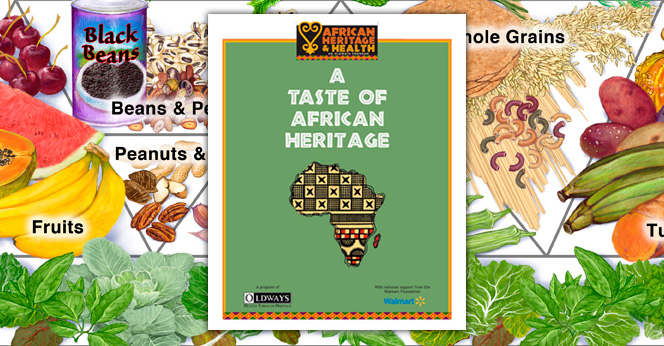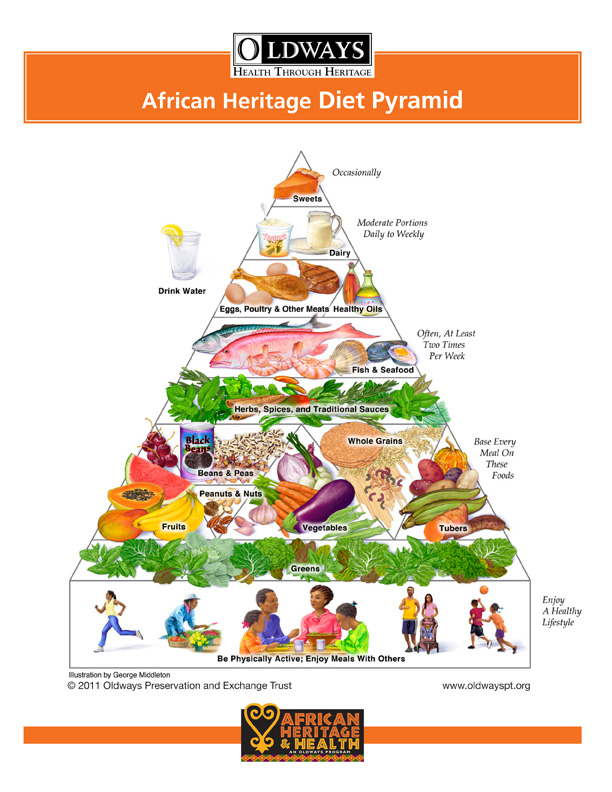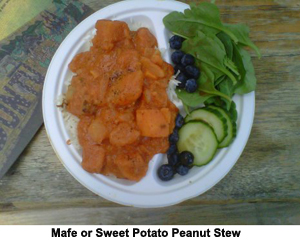I hope this program will reach everyone. A Taste of African Heritage Student, Fayetteville, NC
Oldways A Taste of African Heritage (ATAH) classes are cooking up around the country. Equipped with the African Heritage Diet Pyramid, an enhanced curriculum and a collective mission to improve health and nutrition, volunteer teachers are bringing this 6-week program to churches, community
centers, schools, and home kitchens to share the joys and benefits of tradition foods and flavors of the African Diaspora.
This year waves of leafy greens, coconut milk, and peanut stew will crash against mountains of millet, sweet potatoes, Jamaican red beans and other delicious traditional dishes at 50 community sites. Another 100 class sites are being planned for 2014, and we’re signing up new teachers everyday on our Teacher Sign Up Form.
So far, ATAH classes are being organized in 21 different states. Participating locations include the Jobcorps Academy in Exeter, RI; The San Francisco Housing Authority; and, Anderson Regional Medical Clinic in Meridian, MS. Teachers have opened up their home kitchens in South Carolina, Georgia, and Virginia, adding an exciting grassroots, neighbor-to-neighbor flavor to the program.
Teachers report being most excited about bringing healthy eating and lifestyle practices based on tradition to their communities. Students are discovering new spices, new cultural ways of preparing vegetables, how to easily prepare dry beans and various whole grains, and a new historical and pleasurable experience of healthy eating.
I caught up with Rev. Thomas Murray, instructor of our first class of 2013 at the Emmanuel Baptist Church in Fayetteville, NC, and asked him how he sees heritage and tradition as motivators for eating and living well.
Q. You are clearly very passionate about healthy eating, and you have made diet and lifestyle a part of your congregations mission at Emmanuel Family Baptist Church. What was the spark that first got you personally invested in food and health
Rev. Murray: Reading! Discovering books about health and nutrition, and making that connection. I was inspired enough to open a natural foods store in Philadelphia for people who are mindful of nutrition and are looking for teas, spices, herbs, essences, oils, organic foods, books and more. I have been reading ever since. Most inspiring to me are the populations around the world known for their longevity, like those in places such as along the Mediterranean and in Okinawa. This is why Oldways and the African Heritage Diet resonate so well with what I teach in our congregation. From what I’ve learned, I teach that there are 3 major methods for longevity:
- Eating a plant-based diet
- Showing love for each other (I call this religion)
- Walking or exercising 30 minutes daily in those Blue Zones people walk 10 miles to work and 10 miles home; theyre always moving
Q. What role does food have in a church community, and how have you tried to shape that in your congregation
Rev. Murray: I offer nutrition classes to the community twice a week, and every Sunday I reiterate the 3 methods for longevity during service. We also enjoy Sunday meals together after service. We stress plant-based eating (my son is a medical doctor in Atlanta, GA and he is a vegan), and vegetables and beans have always been staples on the table.
Q. A Taste of African Heritage was designed to reignite health-promoting foods and traditions found in African American ancestry. Did participants of the program and inspiration in the old ways of eating
Rev. Murray: Certainly. From the first week on, people reported making healthy changes and trying new foods. Many people came to the classes who weren’t a part of our congregation, too, so it opened up our community. We’ve had the Mafe Stew at our Sunday meals, along with other Taste of African Heritage recipes or ingredients. The classes were a joy.
Q. Was there a key message that resonated more than others
Rev. Murray : Diabetes is not a part of African Heritage. That is an exceptionally powerful statement. Diabetes is on the move in people, especially African Americans. I am 78 years old and I’ve never battled with it. I have read from credible sources that 85% of our chronic diseases come from diet. Eating right protects you from them. Its as simple as that.
Q. What’s your favorite Taste of African Heritage recipe, food, or spice And why
Rev. Murray: The Harissa spice. It’s just different. A wonderful way to spice up a meal.
Bravos and much gratitude to Rev. Murray and the Emmanuel Family Baptist Church in Fayetteville for hosting and completing the first 2013 class series this summer! We’re so grateful to all of our teachers everywhere, and we’re excited for all the classes to come.
-Sarah









Leave a comment